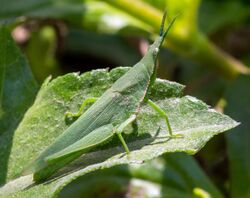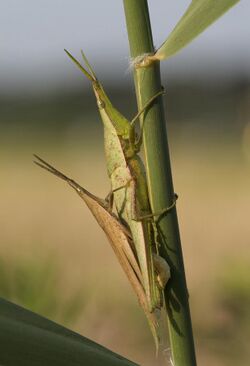Biology:Atractomorpha (grasshopper)
| Atractomorpha | |
|---|---|

| |
| Atractomorpha crenulata | |
| Scientific classification | |
| Domain: | Eukaryota |
| Kingdom: | Animalia |
| Phylum: | Arthropoda |
| Class: | Insecta |
| Order: | Orthoptera |
| Suborder: | Caelifera |
| Family: | Pyrgomorphidae |
| Subfamily: | Pyrgomorphinae |
| Tribe: | Atractomorphini |
| Genus: | Atractomorpha Saussure, 1862 |
| Species | |
|
See text | |
Atractomorpha is a genus in the Pyrgomorphidae, a family of grasshoppers, found in Africa, Asia, and Australia.[1]
Biology
Not much is written about the biology of the Atractomorpha, but they are herbivores typical of the Orthoptera, so it is understandable that some species seem to be minor pests in gardens [2] and that some, such as Atractomorpha psittacina and Atractomorpha bedeli, are significant pests in rice.[3]
As with many grasshoppers in various families, the males are smaller than the females and ride on them long before copulation. They remain there during the period in which the female achieves sexual receptiveness. Similar strategies are common in vertebrates such as some amphibians, as well as various invertebrates, where the males attempt to keep rivals from mating with the female.
At least some Atractomorpha species also share a habit with various generally sedentary Orthoptera such as some Pamphagidae, of producing their excreta in the form of relatively few, large, elongated faecal pellets, one at a time. As each pellet emerges, they kick it a considerable distance away, using the tibia of one rear leg. This apparently is a strategy for avoiding the attentions of parasitoids and predators that otherwise might have been attracted to the smell of a host midden.[4][5]
Atractomorpha are active during the day, and their usual habitat is reeds and grasses close to rivers or streams.[6]
Taxonomy
The genus name Atractomorpha is derived from the Greek language and means "spindle-shaped" or "arrow-shaped".[7] Various families of Orthoptera (including the Acrididae and Lentulidae) include genera whose species have similarly cone-shaped heads, and there are genera within the family Pyrgomorphidae (such as Phymateus and Dictyophorus) that do not have cone-shaped heads,[8] so their superficial appearance may be misleading even for professionals not specifically active in that field.
Species
The genus consists of the following species:
- Atractomorpha aberrans Moldova, 1788
- Atractomorpha aberrans Karsch, 1888
- Atractomorpha acutipennis Guérin-Méneville, 1844
- Atractomorpha angusta Karsch, 1888
- Atractomorpha australis Rehn, 1907
- Atractomorpha burri Bolívar, 1905
- Atractomorpha crenaticeps Blanchard, 1853
- Atractomorpha crenulata Fabricius, 1793
- Atractomorpha dubia Wang, Xiangyu, He & Mu, 1995
- Atractomorpha fuscipennis Liang, 1988
- Atractomorpha himalayica Bolívar, 1905
- Atractomorpha hypoestes Key & Kevan, 1980
- Atractomorpha lata Mochulsky, 1866
- Atractomorpha melanostriga Bi, 1981
- Atractomorpha micropenna Zheng, 1992
- Atractomorpha nigripennis Zheng, 2000
- Atractomorpha occidentalis Kevan & Chen, 1969
- Atractomorpha orientalis Kevan & Chen, 1969
- Atractomorpha peregrina Bi & Xia, 1981
- Atractomorpha psittacina Haan, 1842
- Atractomorpha rhodoptera Karsch, 1888
- Atractomorpha rufopunctata Bolívar, 1894
- Atractomorpha sagittaris Bi & Xia, 1981
- Atractomorpha similis Bolívar, 1884
- Atractomorpha sinensis Bolívar, 1905
- Atractomorpha suzhouensis Bi & Xia, 1981
- Atractomorpha taiwanensis Yin & Shi, 2007
- Atractomorpha yunnanensis Bi & Xia, 1981
References
- ↑ "Vegetable Grasshopper". Museum of Queensland. https://www.qm.qld.gov.au/Find+out+about/Animals+of+Queensland/Insects/Grasshoppers+Crickets+and+Katydids/Common+species/Vegetable+Grasshopper#.XXkOHShKiUk.
- ↑ "The World's Best Photos of atractomorpha - Flickr Hive Mind". http://fiveprime.org/hivemind/Tags/atractomorpha/Interesting.
- ↑ Shepard, B. M. Barrion, A. T. Litsinger J. A. Rice-Feeding Insects of Tropical Asia - Page 116. International Rice Research Institute. Manila, Philippines 1995 ISBN:971-22-0062-0
- ↑ Yosuke TANAKA, Eiiti KASUYA; Flying distance of frass kicked by the grasshopper Atractomorpha lata and factors affecting the flying distance; Entomological Science Volume 14, Issue 2, pages 133–141, April 2011
- ↑ Feedback, New Scientist Number 2810, page 64 and Number 2816, page 64
- ↑ David C. Rentz (1996). Grasshopper Country: The Abundant Orthopteroid Insects of Australia. UNSW Press. p. 168. ISBN 9780868400631. https://books.google.com/books?id=G0Z2wY2B2ncC&pg=PA168.
- ↑ Jaeger, Edmund C. (1959). A Source-Book of Biological Names and Terms. Springfield, Ill: Thomas. ISBN 0-398-06179-3. https://archive.org/details/sourcebookofbiol0000jaeg.
- ↑ Alan Weaving; Mike Picker; Griffiths, Charles Llewellyn (2003). Field Guide to Insects of South Africa. New Holland Publishers, Ltd. ISBN 1-86872-713-0.
External links
Wikidata ☰ Q4817493 entry
 |


